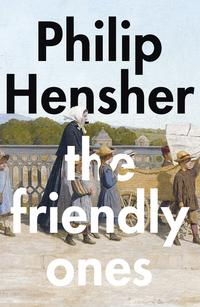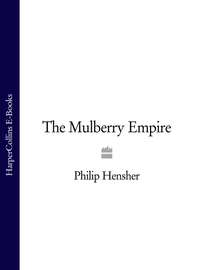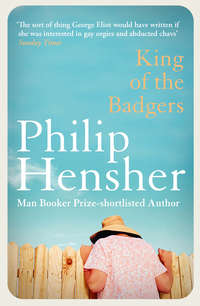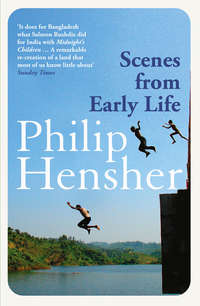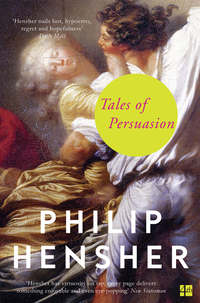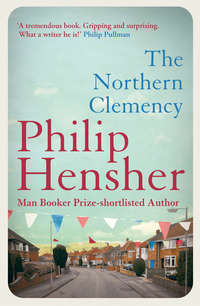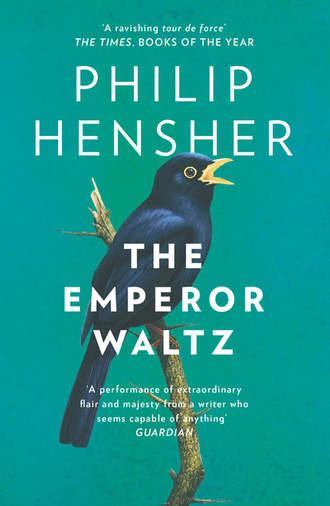
Полная версия
The Emperor Waltz
3.
That evening, his father’s sister from the town of Brandenburg came to dinner. She was a twice-yearly visitor who turned up in the city to make sure of her affairs, which her brother handled, and in the last year, to ensure that her brother and nephews were continuing to live in a respectable way at home, despite her sister-in-law’s death from influenza. She was a small, beady woman, full of news of Brandenburg life. Her brother had moved away from Brandenburg thirty-five years before, to the opportunities offered by a university education, a long apprenticeship, a marriage in middle age, children and a solid apartment in Charlottenburg.
‘And Herr Dietmahler sold his house in the Kleiststrasse to his cousin Horst Dietmahler, the younger brother of his father the corn-merchant, his son, whose wife had twins last year. His business is suffering and he no longer needed a house on that scale,’ Aunt Luise continued. The ivory-handled spoon, from the set that came out for guests, rose and fell from the grey potato soup. Occasionally her small hand, beaded with black rings and a triple jet bracelet, reached out and tore at the bread rolls. Between mouthfuls, she spoke in a tired, mechanical way of her town. ‘There was a Frenchman who came to visit last week, who stayed with the Enzelmanns in Magdeburgerstrasse, you remember the beautiful house, the big beautiful house that the Enzelmanns always had, the Frenchman came after writing, he wanted to look at some furniture that Grandfather Enzelmann had brought back from Paris in the 1870 war, you remember, Cousin Ludwig, the beautiful chair and the commode and the looking-glass with the stork and the swan in gold in the drawing room, and the Frenchman came to inspect it, and pretended to admire it before he said it had been stolen from his family. And Minna von Tunzel …’
Kind-hearted Dolphus in his sailor suit stared and listened, wide-eyed. He felt sorry for her, he had told Christian on her last visit: two sons killed in the war, both on the same day, or perhaps one day after the other, thousands of miles apart, and the telegrams making their separate way to Brandenburg, and Uncle Joachim dead of an apoplexy six months later. But Christian could remember how Aunt Luise had been before the war, and her two big, cruel sons too, and perspiring fat Uncle Joachim. His father was nodding decorously as Aunt Luise reached Minna von Tunzel’s parlourmaid’s baby, giving a signal to Alfred to bring in the whiting, in a circle with their tails in their mouths in a grey sauce, as they always were when a guest came. Christian was thinking about the decision he had made that morning, in Friedrichstrasse.
‘Father,’ he said, when the fish had been taken away and Aunt Luise was fumbling in her reticule for a handkerchief. ‘We must talk about what I am to do.’
‘What you are to do, dear boy?’ his father said. He had had a long afternoon with Luise, trying to explain what had happened to her investments and her bonds. He never looked forward to her visits, and this had been a very trying one. ‘Is this an important conversation?’
‘Father, I’ve decided what I want to do after school,’ Christian said, summoning his courage.
‘I thought all that was decided,’ Aunt Luise said nastily, placing her knife and fork on the plate, inspecting, pulling the fork back a tenth of a point so that they would be exactly next to each other. ‘I thought the elder was to be a lawyer and the younger an engineer. The elder boy to study in Nuremberg; the younger to take himself off to London, where the best engineering schools are.’
‘I don’t want to be a lawyer, Father,’ Christian said, not addressing Aunt Luise. To his surprise, there was something like a grey smile in his father’s eyes, something between the two of them. His father did not often engage him with a look: he found it easier to look somewhere else, as if not paying attention. He wondered whether his father had been waiting for him to start this conversation for the last year. ‘I want to go to an art school in Weimar. I would be a very good artist, I know it. It’s all I want to do.’
‘Want to do?’ his father said. ‘I never wanted to be a lawyer, either, but I did, and I was very glad of it in the end.’
‘Karin Burgerlicher’s second-youngest boy—’ Aunt Luise began.
‘You can always paint in your spare time, on Sundays and on holidays, in the Alps,’ his father said. ‘Lawyers often do. But I never heard of an artist who drew up wills and contracts on Sundays and holidays. You could never be any sort of lawyer, you know, if you went to an art school. Wittenberg, you said?’
‘Weimar,’ Christian muttered.
‘Ah, Weimar, a beautiful town also,’ his father said, in a full, satisfied tone. The fish had been taken away, and now, the sour beef was brought in. They sat in silence. Aunt Luise was pretending to be occupied with something in her lap, with handkerchief and pill box. Dolphus gazed at his brother in undisguised wonder. It was not clear to Christian whether his father had reached some conclusion, or whether he now thought that everyone agreed that Christian’s future was as it had always been, had never needed discussion, that the discussion was now over.
‘Father,’ Christian said, when the beef was served and Alfred had left the room.
‘Well, I don’t see why not,’ his father said. ‘The world is changing so much. And if it all fails, you can at least become a town clerk or something of that kind. Or start again. Nothing much would be lost, by your year at an art school. I suppose that your brother Dolphus can still go to London, to become an engineer.’
‘Brother,’ Aunt Luise said in wonderment, dropping her fork in the beef. It was the first time Christian had ever heard his father say anything worth wondering at, the first time he had surprised anyone other than by remaining silent when he might speak. His choice of wife had been the daughter of a judge; his choice of dwelling had been between two other lawyers; his choice of children might have remained as it had been – the elder a lawyer, the younger an engineer. Christian was not surprised that his sister, even though she had known him from the nursery, stared and gasped, and in protest dropped her fork in her sour beef.
‘Thank you, Father,’ Christian said. ‘I would be a very bad lawyer, I know it. And I can be a very good artist.’ He wanted to say that he could be a great artist. But at his father’s dinner table, with greyish well-ironed and patched linen, the greying velvet drapes, the Moritz von Schwind Alpine landscape, the encrusted silver candlesticks on the table and the hissing curlicue of the gas jets on the wall, the words did not come out.
‘One thing I must insist on,’ his father said. ‘There are to be no models lounging about the place of any sort. Now, Luise. Let me help you to what passes for spinach these days.’
Aunt Luise began to tell them about what had happened to Karin Burgerlicher’s younger brother in Rome in the 1890s.
4.
In Weimar, Christian came downstairs from his room, not changed from the Norfolk jacket he had travelled in, but washed and refreshed. He stood for a moment in the hallway with the illuminated light falling through the stairway, then entered the room with the door slightly ajar. In there was a man standing at the window, looking out at the parkland. His head was severe in expression, with large, round glasses, and his hair cut in an abrupt round manner that had nothing to do with the shape of his cranium, as if a bowl had been placed on his head before the scissors had been run about. The room was light and comfortable, with a pair of sofas and an upholstered window-seat where the man stood, and some chairs about the table where tea sat. A number of wasps were buzzing about the room.
‘Good afternoon,’ the man said, in a strong Leipzig accent. ‘You must be our new arrival.’
‘How do you do?’ Christian said, and introduced himself.
‘I am Franz Neddermeyer,’ the man said. ‘Also a guest of Frau Scherbatsky. How do you find your room?’
‘Very nice,’ Christian said. ‘I am from Berlin.’
‘I did not ask you that, although I am pleased to know it,’ Herr Neddermeyer said. ‘This is my house, and also Frau Scherbatsky’s house, although we are not connected through marriage or otherwise and only one of us owns it. How do you make that out?’
‘I think Frau Scherbatsky told me that you are the architect of the house,’ Christian said. ‘Although both the owner and the tenant of a house could talk about it being their house, so that is also a possibility.’
‘Ah,’ Neddermeyer said. He seemed disappointed at the failure of his conundrum. He walked away from the window, where he had left a book lying face down on the window-seat, and about the room, running his finger over the piano keyboard, covered with a crocheted shawl, the top of a bookcase, the wooden back of one of the sofas. As he came up to the chairs at the tea table, he minutely but decisively shifted one a couple of degrees; stepped back; inspected the change; shifted it back again. Christian thought of Aunt Luise as he looked at the middle-aged man – no, the old man: his skin was crêpy and drawn in a diagonal underneath his chin.
‘I had always lived in the house my father built,’ Neddermeyer said. ‘He, too, was an architect, here in Weimar. How do you come to know Frau Scherbatsky?’
‘I do not know her,’ Christian said. ‘My father is a lawyer, and he made enquiries about lodgings in Weimar from a professional associate here, and the professional associate came back with Frau Scherbatsky as a suggestion. His name was Anhalt.’
‘Ah, Lawyer Anhalt,’ Neddermeyer said. ‘His recommendation – well, he is a friend of old of our “landlady”.’ The word was rendered in a comic tone, as if he was amused by the idea that anyone would offer Frau Scherbatsky money to sleep in a part of her property. ‘Would you care for some tea? I don’t know what has happened to Frau Scherbatsky. Herr Wolff, the other guest here, is on business of some sort in Erfurt today, I know.’
This seemed to put an end to Neddermeyer’s curiosity about Christian’s life, and while he was busying himself with the tea, Christian went about the room. On the bookshelf was a small porcelain or perhaps enamel model of an exotic vegetable, an aubergine. Christian picked it up, and just as he did so, a wasp came buzzing at him. He raised one hand to flap it away, and somehow tipped the aubergine to one side. The stalk and cap of the aubergine actually formed the lid of what it was, a jar, and as Christian tipped it sideways, it fell to the polished wooden flooring and broke. Neddermeyer looked up from the teapot.
‘Oh dear,’ he said.
Christian was crimson – he looked at Neddermeyer with horror. ‘I didn’t realize—’ he said. ‘I didn’t realize it had a lid. I just turned it to one side.’
‘Well, that is unfortunate,’ Neddermeyer said. ‘Let me see.’ He put the teapot down and came over. Without its stalk and cap, the aubergine hardly looked like an aubergine any longer, just a bulbous purple vase. It, clearly, would not do. ‘That really is unfortunate.’
Neddermeyer was, in fact, rather enjoying this humiliation. ‘Please help me, Herr Neddermeyer,’ Christian said. ‘It can’t be the first thing I do when I arrive in poor Frau Scherbatsky’s house, start smashing her things about.’
‘No,’ Neddermeyer said. ‘Although, you must admit, it is the thing which you have started by doing.’ He picked up the lid from the floor. ‘It is really not as bad as all that. A very clean break. And here is our hostess.’
Frau Scherbatsky came in, smiling. ‘I hope you have not been waiting – the tea must be quite cold. I had to finish a letter to my daughter in Dresden. Now—’
‘Frau Scherbatsky,’ Christian began.
‘A terrible thing has happened,’ Neddermeyer said. ‘I was brushing past the bookcase when my sleeve unfortunately caught your very ugly jar here; it fell; the lid has smashed. But there is good news! It is not so badly broken. It can be mended and riveted very easily.’
‘Oh dear,’ Frau Scherbatsky said. ‘Is it so very ugly? I never really thought of it. I don’t suppose it is even any use in the marketplace – no one would barter anything for it, I am certain. By all means, take it and mend it if it salves your conscience, Herr Neddermeyer.’
Christian, full of silent gratitude for the saving of the situation, tried to engage Neddermeyer’s eye, but he quizzically raised an eyebrow without looking in more than Christian’s general direction. ‘Here is some orange cake,’ he said, sitting down. ‘My favourite.’
The orange cake was dry, perhaps a day or two past its best, and flavoured artificially rather than with peel and juice. Christian took a bite just as Frau Scherbatsky said, ‘You are here to study, Herr Vogt, you were saying?’ He could not for the moment speak: his mouth was full of dry cake and his eyes, at once, began to fill with tears of shame at his vandalism. Instead of going on talking – she had asked only for the benefit of Neddermeyer – Frau Scherbatsky waited with a courteous half-smile as Christian took a great gulp of tea to wash it down. He felt like a brutal animal invited to tea with two clever, immaculate dolls, and to finish off the toy-like impression of beauty of Frau Scherbatsky’s house, he now saw, as he prepared to speak, that the teapot from which she had poured was ingeniously shaped in the form of a cauliflower, and the teacup from which he was about to drink was a circle of cauliflower leaves. He swallowed, shook his head.
‘You are a student of what, Herr Vogt?’ Neddermeyer said.
‘I am about to begin the study of art,’ Christian said.
‘Ah, excellent,’ Neddermeyer said. ‘An art historian. That is excellent. At the university here?’
‘No, Herr Neddermeyer,’ Christian said. ‘I am studying to become an artist.’
‘At my old school, then,’ Neddermeyer said. ‘Is it still in existence? I came here myself to study there, here in Weimar, when I was no more than nineteen, and I have never left. Thirty-eight years ago this autumn. We architecture students had little to do with the fellows on the painting and drawing side. I expect things are just the same now – one half thinks the other flibbertigibbets, and the other thinks them dull, money-grubbing fellows. Artists never change.’
‘You put it so well, Herr Neddermeyer,’ Frau Scherbatsky said. ‘But is the art school that you are thinking of still in existence, Herr Neddermeyer, even?’
‘I am enrolled at the Bauhaus,’ Christian said. ‘It is only just opening now.’
‘The Bauhaus,’ Neddermeyer said. There was a perceptible chilling; he set down his tea and tipped his head back slightly, inspecting Christian over the top of his glasses. ‘The Bauhaus.’
Christian had the distinct impression that Neddermeyer was now about to change his mind about his previous brotherliness and to tell their landlady that, after all, it had been Christian who had smashed the aubergine pot.
‘I know the Bauhaus,’ Neddermeyer said. ‘There is wild talk in the town, both about them and, I must say, by them. When you are as old as I am, you have seen plenty of young men who hope to change the world by shocking their elders. And as time goes on, the shock fades away – the shock and the desire to shock. You hope only to make things as well as your ancestors made them. That may prove difficult enough. The Bauhaus. Well. They wish to make things new, I believe, and turn our lives upside down; to ask us to sit on tetrahedrons, and to live in houses made of glass, like tomatoes. I have seen plenty of wild young men, wanting to change the world by shocking their elders. I may have been one of them myself, once upon a time.’
Christian inspected the cauliflower teapot; the inglenook fireplace; the padded window-seat. He did not object.
‘Young people will not like the same things as old people,’ Frau Scherbatsky said, smiling. ‘You must admit that if no new opinions ever came along we should be living in the houses of Augustus the Strong.’
‘I don’t think anyone wants to shock,’ Christian said. ‘I think we only want to start by making new things. But I haven’t been there yet. I am sure you know more about it than I do.’
Neddermeyer had got up and, holding his leaf-shaped teacup, had gone over to the window, perhaps to hide his emotions. It seemed as if the mention of the Bauhaus struck some chord with him. ‘They seem very little interested in Weimar, where they are,’ he said. ‘I don’t believe they recruited any teaching staff from the town, though, Heaven knows, there are enough talents and experience to power a—’
‘Herr Neddermeyer feels strongly,’ Frau Scherbatsky said confidentially but audibly, leaning her whole body towards Christian from her chair. ‘He was very unfortunately—’
‘And here they come,’ Neddermeyer said, his voice raising gleefully as he looked out of the window. ‘I don’t know whether you have seen your colleagues and masters yet? They come this way every day, around this time, for their exercise. I promise you, I did not ask them to appear to prove any kind of a point.’
5.
In the park, three hundred metres away, a small group of people was approaching. They had shaven heads that shone in the sun like wet pebbles by the lakeside. There were eight or nine of them; their smiles, too, shone in the light. It was their clothing that seemed most extraordinary. An elderly woman in a fur-collared overcoat was just now pausing, thirty metres from them, and watching them with open fascination. They wore floor-length robes in purple, flapping as they moved; home-made and evidently not well fitting. The robes looked very much like the garb of a wizard Christian had seen in a childhood pantomime. The tallest of the group, a man in his late twenties or early thirties, wore also a metal collar, like a pewter platter with the middle excised. The group surged around him; their combined movement was uniform, rippling, wavelike and unnervingly joyous. Christian felt that if he left the house and went towards this group he would be brought in; he would experience their joy, cut off from the delights and sorrows of the world about him. And yet he did not want to go towards them. The single, jogging, up-and-down rhythm of their heads, like a string ensemble approaching a climax, was unnatural and fruitless. What were they doing? They seemed to be going for a walk, but they were pressed together too tightly for that; they might have been a single body. Their smiles and joyous movements suggested that someone in there was talking, but you could not see that they were anything but silent as they walked. They moved to some music, audible only to themselves. With a shock, Christian saw that they were men and women mixed, brought into a uniformity of appearance by their heads being shaved.
As they passed, their attention seemed forward-facing. But one of them – a woman, it looked like – must have felt the gaze of Frau Scherbatsky, Herr Neddermeyer and Christian upon her from the leaded window of the house. She turned, alone, as if rebelling against the will of the group and, with a habitual but pointless gesture, made a movement over her shaved head. Her wide and empty smile – her mouth was, he could see, too large for her little face – did not alter; he could not see whether she had, in fact, engaged with his look or seen the three of them through the window at all. He felt ashamed. In a moment the girl in her loose Biblical robe of purple turned away again, and the tightly knit procession, like a performance, moved on away from them.
‘They come every day, around this time,’ Frau Scherbatsky said. ‘I couldn’t tell you what it is all about. My neighbours are fascinated by it.’
‘I think it is some kind of newly invented religion,’ Neddermeyer said.
‘Oh, surely not,’ Frau Scherbatsky said. ‘At first we believed that it was some sort of advertisement for a children’s play, something of that sort – the seven noble wizards, you know, Herr Vogt.’
‘Do you know where they come from?’ Christian said. They resumed their seats; Neddermeyer continued to stand at the window, entranced.
‘Yes, indeed,’ Frau Scherbatsky said. ‘They come from the Bauhaus.’
‘The one at the front,’ Neddermeyer said. ‘Did you see? The one at the front, taller and older than the rest, he is actually a member of the teaching staff. I have heard that he has, indeed, invented a new religion, which he requires his students to follow. We were quite safe up here, but if you come close to them, seeing them by chance in the street, they emit an overpowering scent of garlic. I have heard that one of the tenets of the religion is that nothing else may be eaten. A sort of purge.’
‘Very inconsiderate to the rest of us,’ Frau Scherbatsky said.
‘If, when I was a student of architecture all those years ago, I had been told that my professor wished me to wear violet robes in public, to shave my head, to eat nothing but garlic, and to follow a new religion of his devising …’ Neddermeyer started to say.
Frau Scherbatsky nodded, perhaps embarrassed on behalf of Christian. ‘Where is Herr Wolff, Herr Neddermeyer? Did he tell you?’
‘I believe he is in Erfurt this afternoon, on business,’ Neddermeyer said. ‘His usual business. He said he was unsure whether he would return this evening.’
‘Really,’ Frau Scherbatsky said. ‘That, too, is inconsiderate. He might have told me before he went away.’
6.
In a room not so very far away, with a similar view of the park, a man and a twelve-year-old boy sat. The room was hung with paintings; in each of them, an animal, a form, an arrangement of lines, an exclamation mark, the heads of people as drawn by children could be seen. On the easel, a square canvas with blotches and stains in ochre, violet and umber. The boy and the man sat at the tea table, set with a cloth and an old, dented silver tea service. The man fixed the boy with his gaze; the boy’s eyes were huge. The man took a small cardboard box from his pocket, opened it and took out a sugar cube, delicately, with his thin fingers on which paint had dried and dirt been allowed to accumulate beneath his nails. With the tips of his fingers, his eyes never leaving the boy’s face, he lifted the silver lid of the sugar bowl, and dropped the sugar cube among other, nearly indistinguishable sugar cubes. He lowered the lid, and replaced the cardboard box in his pocket. His hands were paint-stained, but his clothes were immaculately clean; Klee liked to take off his painting smock before he had his tea in the afternoon. The boy’s eyes filled with premonitory laughter. Underneath the table on a Turkish leather cushion, a cat slept in its favourite place, curled with its face into its belly, its feet about its face, and paid no attention to anything that was happening.
There seemed nothing more to say. Klee sat back and took out the cigarette he liked to smoke before tea. In one of their shared rituals, Felix got up and went about the studio until he found the place where his father had last left his matches. This time it was by the window-seat, where he often liked to prowl and stand before the view while thinking about his next move on a painting. Not exactly looking at the view, more a matter of letting the world flood in without seeing it, his father had once said. For a second, as he picked up the matches, Felix tried the trick. But it was no good. He could not help actually looking at the world; at the pack of shaved-head wizards moving off into the distance following Johannes Itten, the trees in the park, a blackbird sitting on the branch nearest to the house, and his mother almost at the gate of the house, returning from her walk and already unbuttoning her coat in her eagerness for her tea. He took the matches over to his father and, as he was allowed to, struck one, holding it up to his father’s cigarette.
‘Mother is here,’ Felix said. ‘I saw her just coming up the road.’
His voice trembled with his terrible amusement, thinking of the sugar cube. His father sucked at the end of the cigarette and said nothing. His face was mask-like in its skin; Gropius’s wife had once asked his father whether it didn’t hurt, having a face like that, so tight like a drum, and his father’s face had grown still more mask-like, pulling back into a world of squareness. Felix had twelve tasks in the house, and they were added to every year, at an unspecified date; they included lighting his father’s cigarettes, turning the pages at the piano, announcing dinner when guests came and, most recently, cleaning his own boots. Today his task was to remain normal until the sugar cube turned into what it would turn into.


